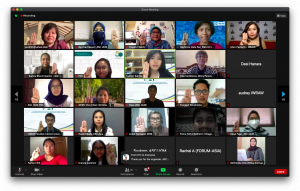Ambassadorial Lecture on ASEAN-Egypt Outlook: Challenges and Future Prospects
On Monday, 29th November 2021, the ASEAN Studies Center held an Ambassadorial Lecture on ASEAN-Egypt Outlook: Challenges and Future Prospects. The lecture takes place online by streaming on ASEAN Studies Center UGM Youtube channel. The lecture session was delivered by H.E. Amb. Ashraf M. Sultan, the Ambassador of Egypt to ASEAN and Indonesia, accompanied by the Executive Director of ASEAN Studies Center UGM Dr. Dafri Agussalim M.A as the moderator.
The lecture highlighted several issues in the areas of Egypt-ASEAN relations. H.E. Amb. Ashraf M. Sultan started his speech by giving several brief remarks on what happened on Egypt lately after some political disturbances in 2011 and 2013 that showed the need of economic and social reforms to change many constants and introduce new practices. Moreover, the speech delivered by Ambassador Ashraf also highlighted the possibilities of qualitative bilateral exchange with ASEAN Countries in overcoming the Covid-19 Pandemic and further economic and social recoveries by sharing common sense on not neglecting the permanent goals on sustainable development program which designed to secure the welfare of the citizen in either Egypt or ASEAN Countries. Ambassador Ashraf mentioned that Egypt and ASEAN Countries needs to start discovering and creating the new knowledge to develop the capabilities on both sides to enter new markets and have more input and contribution to the world scientific and technical progress as well. Those initiation could be useful to find an appropriate format for extending cooperation and exchanging knowledge and best practices.
The lecture was followed by a Questions and Answers session by the participants. The talk was lively as participants were eager to raise questions on compelling topics regarding ASEAN-Egypt relations and their cooperation prospects. Among them were questions on the future initiatives and development to be exchanged between Egypt and ASEAN
In closing, the ASEAN-Egypt Oulook Ambassadorial Lecture, H.E. Amb. Ashraf M. Sultan concluded that ASEAN and Egypt are both developing economies and both are looking for more big spaces for technical cooperation in unusual fields and probably should not be in a traditional way that could be focused on trade and direct cooperation. The expanding of bilateral relations is possible to automatically expanding the investment and trade all the way. The challenges that could be faced by the cooperation between Egypt and ASEAN Countries should be addressed wisely and need to be accomplished more to give new initiative on Egypt-ASEAN relations.
Report by Syukron Subkhi
Media and Publication Officer at ASEAN Studies Center UGM
#ASEAN #SoutheastAsia #ASEANStudiesCenter #ASC #UGM #Webinar #Dialogue #Egypt #EgyptEmbassy #EgyptASEAN #Prospects #Cooperation #InternationalRelations #ASEANDialogue #TAC #treatyofamityandcooperation

 The discussion has invited Dr. Randy W. Nandyatama as the book’s author and senior researcher at ASEAN Studies Center UGM. Furthermore, several academicians and practitioners on human rights advocacy were also invited to enliven the discussion. H. E Yuyun Wahyuningrum as Representative of Indonesia at AICHR and Senior Advisor at HRWG, Assoc. Prof. Anthony J. Langlois as an Associate Professor from College of Business, Government, and Law at Flinders University, and Asst. Prof. Deepak Nair as Assistant Professor of the Political Science National University of Singapore. The discussion was moderated by Yulida Nuraini Santoso as the Managing Director of ASEAN Studies Center UGM.
The discussion has invited Dr. Randy W. Nandyatama as the book’s author and senior researcher at ASEAN Studies Center UGM. Furthermore, several academicians and practitioners on human rights advocacy were also invited to enliven the discussion. H. E Yuyun Wahyuningrum as Representative of Indonesia at AICHR and Senior Advisor at HRWG, Assoc. Prof. Anthony J. Langlois as an Associate Professor from College of Business, Government, and Law at Flinders University, and Asst. Prof. Deepak Nair as Assistant Professor of the Political Science National University of Singapore. The discussion was moderated by Yulida Nuraini Santoso as the Managing Director of ASEAN Studies Center UGM. “Sittwe” is a story about two teenagers from opposing sides of deadly religious and ethnic conflict. The movie provides voice to the youth in a deeply divided society, to create a space for dialogue about reconciliation. Phyu Phyu Than is a Rohingya Muslim girl and Aung San Myint is a Buddhist boy from Myanmar. Both saw their homes burned down during communal violence in 2012. In the discussion, Jeanne Hallacy highlighted the issue of education which is part of human rights and social justice. Mr. Irawan Jati highlighted conflict resolution in the states, in which the current unstable political situation on Myanmar is a sincere narrative of survival. Meanwhile. Lastly, Thiha Wint Aung as the representative of youth from Myanmar in this discussion, he explained the history of the conflict, how the conflict could have occurred and how is the current condition of Myanmar. The discussion about the movie “Sittwe” became more interesting with a Q&A session with the participants of this event.
“Sittwe” is a story about two teenagers from opposing sides of deadly religious and ethnic conflict. The movie provides voice to the youth in a deeply divided society, to create a space for dialogue about reconciliation. Phyu Phyu Than is a Rohingya Muslim girl and Aung San Myint is a Buddhist boy from Myanmar. Both saw their homes burned down during communal violence in 2012. In the discussion, Jeanne Hallacy highlighted the issue of education which is part of human rights and social justice. Mr. Irawan Jati highlighted conflict resolution in the states, in which the current unstable political situation on Myanmar is a sincere narrative of survival. Meanwhile. Lastly, Thiha Wint Aung as the representative of youth from Myanmar in this discussion, he explained the history of the conflict, how the conflict could have occurred and how is the current condition of Myanmar. The discussion about the movie “Sittwe” became more interesting with a Q&A session with the participants of this event.